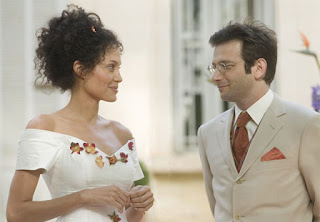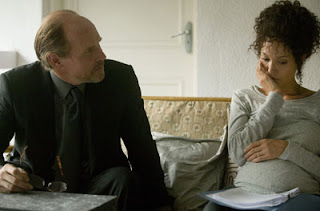 of the woman who has left him behind. Clouds drifting by fast in a bright blue sky, an open road that looks like the face of an ugly man, a house falling down from the sky and into pieces, all the usual dreamy aspects which make up a real Van Sant seem to be there. Experimenting with shots that can be seen as daring, like the one in the diner the two main characters and their friends like to hang out, which show the two main protagonist conversating inside, but from outside or the way some of their friends speak about their experiences separtely, but all at the same time, moving from one character to another, not waiting for one person's story to be finished before moving on to the next. My Own Private Idaho is amazing when looking at it from a visual perspective. It's what is most interesting about the film and what makes you keep watching. It keeps you engaged and make you look even closer waiting anxiously for what's more to come. Narratively, the film isn't as good. Inspired and based on parts of Henry VI and V by William Shakespeare, the movie's dialogue sometimes copies exact lines from the play, an aspect that can be added to the wonderful amount of interesting little things that My Own Private Idaho has to offer. It's style which overpowers the film's story and characters. However, who is able to grab your full attention is River Phoenix. The actor who died at a very young age gives a very strong and fresh performance. His talent really shows through. Stating to be 'a connoisseur of roads' Phoenix makes you care for the boy he presents, searching for his mother's love and longing for more than friendship from his best friend. Phoenix engages you to stick with him and try to figure out what to do with his life. Someone who unfortunately never really seems to convince is Keanu Reeves. Always making it hard for a viewer what to make out of his performance, he again is seen speaking with the same static voice he always speaks with. An actor as Reeves makes you question what it is that makes for a good performance and how much it has to relate to our conventions of reality. Vividly bringing to life a dreamlike and somewhat imaginary world, My Own Private Idaho sometimes seem to resemble paintings, with Van Sant always knowing brilliantly to put together the right colours.
of the woman who has left him behind. Clouds drifting by fast in a bright blue sky, an open road that looks like the face of an ugly man, a house falling down from the sky and into pieces, all the usual dreamy aspects which make up a real Van Sant seem to be there. Experimenting with shots that can be seen as daring, like the one in the diner the two main characters and their friends like to hang out, which show the two main protagonist conversating inside, but from outside or the way some of their friends speak about their experiences separtely, but all at the same time, moving from one character to another, not waiting for one person's story to be finished before moving on to the next. My Own Private Idaho is amazing when looking at it from a visual perspective. It's what is most interesting about the film and what makes you keep watching. It keeps you engaged and make you look even closer waiting anxiously for what's more to come. Narratively, the film isn't as good. Inspired and based on parts of Henry VI and V by William Shakespeare, the movie's dialogue sometimes copies exact lines from the play, an aspect that can be added to the wonderful amount of interesting little things that My Own Private Idaho has to offer. It's style which overpowers the film's story and characters. However, who is able to grab your full attention is River Phoenix. The actor who died at a very young age gives a very strong and fresh performance. His talent really shows through. Stating to be 'a connoisseur of roads' Phoenix makes you care for the boy he presents, searching for his mother's love and longing for more than friendship from his best friend. Phoenix engages you to stick with him and try to figure out what to do with his life. Someone who unfortunately never really seems to convince is Keanu Reeves. Always making it hard for a viewer what to make out of his performance, he again is seen speaking with the same static voice he always speaks with. An actor as Reeves makes you question what it is that makes for a good performance and how much it has to relate to our conventions of reality. Vividly bringing to life a dreamlike and somewhat imaginary world, My Own Private Idaho sometimes seem to resemble paintings, with Van Sant always knowing brilliantly to put together the right colours.What Is It About?
Loosly based on parts of the plays Henry IV and V by William Shakespeare, My Own Private Idaho tells the story of Mike Waters, a somewhat lost teenager who suffers from narcolepsy, which can suddenly make him fall asleep in the middle of the day, and his friend and fellow male prostitute Scott Favor, who, like the character from the plays by Shakespeare, tries to avoid falling into his father footsteps. In doing so, Scott, a very
 privileged son with a wealthy father, has left home and joined the group of kids living on the streets who sell their body for money. In search for Mike's mother the two boys head off onto a road trip on Scott's motorcycle. After getting information from Mike's older brother in Idaho, who might even be Mike's real father, of where is mother could possibly be by now, they leave to Rome, Italy, where Scott finds love with an Italian beauty, marking the end of his anarchic days. With his friend's choice to move back to the social class he was born in, Mike's now left on his own to figure out his life which he spends falling asleep randomnly, daydreaming, and lost in melancholic thoughts.
privileged son with a wealthy father, has left home and joined the group of kids living on the streets who sell their body for money. In search for Mike's mother the two boys head off onto a road trip on Scott's motorcycle. After getting information from Mike's older brother in Idaho, who might even be Mike's real father, of where is mother could possibly be by now, they leave to Rome, Italy, where Scott finds love with an Italian beauty, marking the end of his anarchic days. With his friend's choice to move back to the social class he was born in, Mike's now left on his own to figure out his life which he spends falling asleep randomnly, daydreaming, and lost in melancholic thoughts.Final Verdict: ****
Though not perfectly realized , My Own Private Idaho is a beautiful depiction of youth, touching upon the ambiguity of sexuality and desires. A visual feast and very thoughtful choices, make of Gus Van Sant's film a great portrait of the life of a teenage boy trying to find out life and himself. The film's made up out of sections, taking the characters and the viewer to different places in this part of the US and eventually Rome. Great is the use of colour, not only in the
 diegetic world portrayed, but also during the intertitles and credits. The bright colourful splashes make of the film a compact whole. With lines coming straight out of Shakespeare's play, the film is one made up out of many layers, giving more meaning to its story than the eye can see during a first view. My Own Private Idaho asks to be watched again, which is one of the qualities of a good film, which is interesting beyond its narrative. Having seen Van Sant's latest films, one can only hope for him to once again go back to a work like this. It doesn't mean his more recent films aren't good, but based on details and multiple meanings this one is more interesting and feels to have a bit more substance than some of his more recent work.
diegetic world portrayed, but also during the intertitles and credits. The bright colourful splashes make of the film a compact whole. With lines coming straight out of Shakespeare's play, the film is one made up out of many layers, giving more meaning to its story than the eye can see during a first view. My Own Private Idaho asks to be watched again, which is one of the qualities of a good film, which is interesting beyond its narrative. Having seen Van Sant's latest films, one can only hope for him to once again go back to a work like this. It doesn't mean his more recent films aren't good, but based on details and multiple meanings this one is more interesting and feels to have a bit more substance than some of his more recent work.






-copy.jpg)





